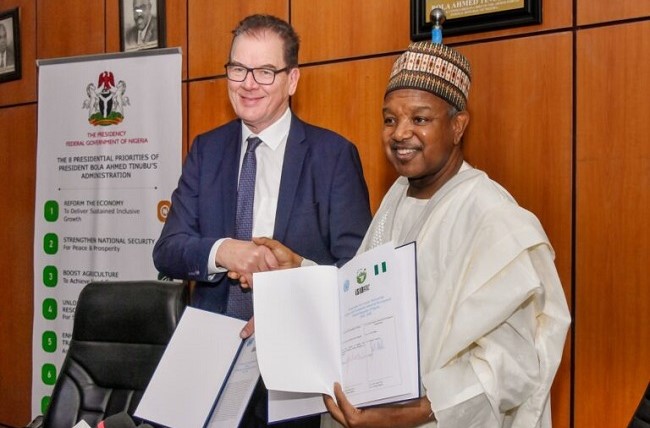The Federal Government of Nigeria and the United Nations Industrial Development Organisation (UNIDO) have signed a $175 million Programme for Country Partnership (PCP).

While signing the agreement on Wednesday, April 2, 2025, in Abuja, the Minister of Budget and Economic Planning, Sen. Abubakar Bagudu, said that the programme was to accelerate Nigeria’s industrial development and economic transformation.
According to Bagudu, the initiative aligns with the government’s Agenda 2050, the National Development Plan, and the Renewed Hope Agenda of President Bola Tinubu.
“Through this partnership, we aim to enhance Nigeria’s industrial capacity, drive technological innovation, and promote sustainable growth.
“The total budget earmarked for the PCP 2024-2028 amounts to $174.585 million with a clear funding strategy.
“The government of Nigeria has committed a counterpart contribution of 14.3 per cent amounting to $24.965 million while UNIDO will mobilise the remaining 85.7 per cent, totaling $149.19 million,” he said.
Bagudu said that while Nigeria’s absorptive investment capacity ran into hundreds of billions of dollars, the PCP would catalyse private sector participation and broaden access to capital.
“Of course, the absorptive capacity of our economy is in hundreds of billions of dollars. But nevertheless, this cooperation will help catalyse our ability to absorb that investment and broaden the areas.
“This is particularly for the private sector that is well represented here, to take advantage of this and broaden access to capital internationally.
“The financial framework demonstrates government’s dedication to driving industrialisation while leveraging on international partnership to maximise impact,” he said.
According to the minister, the programme will strengthen industrial growth, create jobs and drive economic transformation.
He said that it would also support President the Federal Government’s bold economic reforms, which had repositioned Nigeria as a competitive economy.
He highlighted key economic reforms undertaken by the government, including the removal of oil subsidies, introduction of rule-based foreign exchange system, and inauguration of a consumer credit programme.
“For a country of over 200 million people, consumer credit is essential to driving demand for locally manufactured goods.
“This will ensure that manufacturers, both small and big, can focus on efficiency rather than market absorption challenges,” he said.
Bagudu also emphasised Nigeria’s energy transition efforts, noting that the country is prioritising Compressed Natural Gas (CNG) and Liquefied Natural Gas (LNG) as cost-effective alternatives to petrol and diesel.
“We are committed to reducing industrial production costs through cheaper and more reliable energy sources.
“Our transition to CNG and LNG will make Nigeria’s manufacturing sector more competitive,” he stated.
The President of the Manufacturers’ Association of Nigeria (MAN), Francis Meshioye, said that PCP was a tool for implementation of the industrial component of the country’s national development plan.
According to Meshioye, over 1000 staff of manufacturing companies are experts operating within industrial zones and benefiting from the capacity-building component of the project.
He said that the organised private sector and manufactures would support by giving the needed resources to allow proper domestication of the methodologies.
“I would like to assure you of our readiness to respond positively and support you in the implementation of the key pillars of the programme,” he said.
By Nana Musa and Lucy Ogalue
